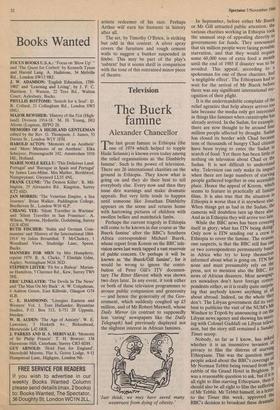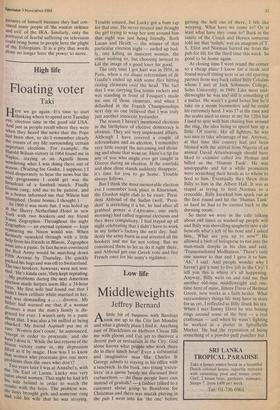Television
The Buerk famine
Alexander Chancellor
rr he last great famine in Ethiopia (the one of 1974 which helped to topple Haile Selassie) is known even today among the relief organisations as 'the Dimbleby famine'. Such is the power of television. There are 26 international charities on the ground in Ethiopia. They know what is going on and they do their best to tell everybody else. Every now and then they issue dire warnings and make dramatic appeals. But very little tends to happen until someone like Jonathan Dimbleby appears on the scene and returns home with harrowing pictures of children with swollen bellies and matchstick limbs.
Perhaps the current tragedy in Ethiopia will come to be known in due course as 'the Buerk famine' after the BBC's Southern Africa correspondent Michael Buerk, whose report from Korem on the BBC tele- vision news last week tapped a vast reservoir of public concern. Or perhaps it will be known as 'the Buerk/Gill famine', for it would be wrong to ignore the contri- bution of Peter Gill's ITV documen- tary The Bitter Harvest which was shown two days later. In any event, it took either or both of these television programmes to arouse public compassion and generosity — and hence the generosity of the Gov- ernment, which suddenly coughed up £5 million, and of Mr Robert Maxwell, whose Daily Mirror (in contrast to supposedly less 'caring' newspapers like the Daily Telegraph) had previously displayed not the slightest interest in African famines.
'Just think, we may have saved many westerners from dying of obesity.' In September, before either Mr Buerk or Mr Gill attracted public attention, the various charities working in Ethiopia took the unusual step of appealing directly to governments for funds. They announced that six million people were facing possible starvation, and that they would require some 60,000 tons of extra food a month until the end of 1985 if disaster was to be avoided. This appeal, according to a spokesman for one of these charities, had 'a negligible effect'. The Ethiopians had to wait for the arrival of Mr Buerk before there was any significant international rec" ognition of their plight.
It is the understandable complaint of the relief agencies that help always arrives too late because the media only get interested in things like famines when catastrophe has already arrived. In the Sudan, for example, there are now thought to be around four million people affected by drought. Sudan has closed its border with Chad because tens of thousands of hungry Chad citizens have been trying to enter the Sudan in search of food. Yet there has been little 01 nothing on television about Chad or the Sudan. It is not difficult to understand why. Television can only make its impact when there are large numbers of starving people gathered together in one accessible place. Hence the appeal of Korem, which seems to feature in practically all famine films. It is also true that the situation in Ethiopia is worse than it is anywhere else. When things get as bad in the Sudan, the cameras will doubtless turn up there also. And as in Ethiopia they will arrive too late. While the BBC news has been covering itself in glory, what has ITN being doing. Only now is ITN sending out a crew to Ethiopia to cover the famine. The reason, one suspects, is that the BBC still has one or two correspondents permanently based in Africa who try to keep themselves informed about what is going on. ITN has none and must presumably rely on the press, not to mention also the BBC, 101 news of African disasters. Most newspar ers nowadays don't have foreign corres- pondents either, so it is really quite surpris: ing that anybody knows anything at all about abroad. Indeed, on the whole they don't. The Libyan government did its very best to publicise the visit of the NUM's Mr Windsor to Tripoli by announcing it on the Libyan news agency and showing his meet" ing with Colonel Gaddafi on Libyan televt" sion, but the story still remained a Swag Times scoop. Nobody, so far as I know, has asked, whether it is an insensitive invasion 0` privacy to film the distress of starving Ethiopians. This was the question many people asked about the BBC's coverage °i Mr Norman Tebbit being rescued from the rubble of the Grand Hotel in Brighton: It was a reasonable question to ask, but if it 1.5 all right to film starving Ethiopians, then it should also be all right to film the suffering of Mr Tebbit. Mr Tebbit himself, in a letter to the Times this week, approved the BBC's decision to broadcast these dramatic
pictures of himself because they had con- vinced many people of 'the wanton violence and evil' of the IRA. Similarly, only the portrayal of fearful suffering on television could bring home to people here the plight of the Ethiopians. It is a pity that words alone no longer have the power to move.











































 Previous page
Previous page